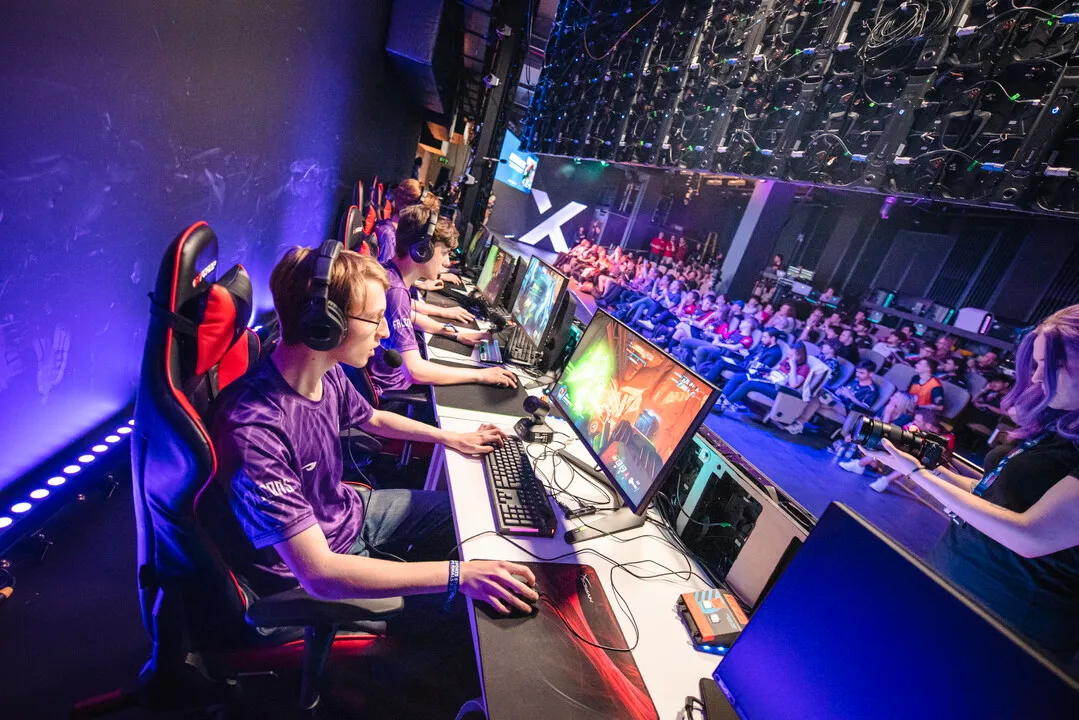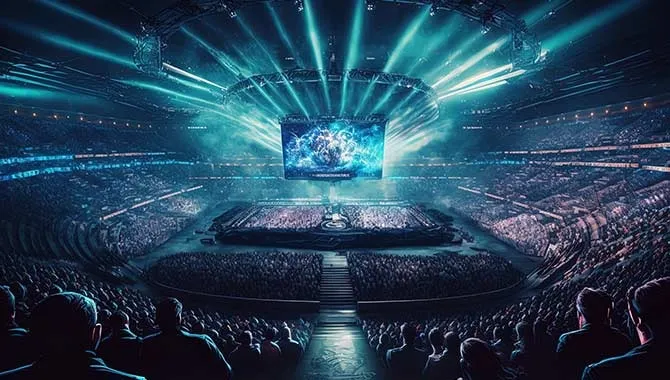
The Rise of Esports Exploring the Biggest Esports Teams in the World
Esports, or electronic sports, is a form of competitive video gaming that has taken the world by storm. With its growing popularity and huge fan base, esports has become a multi-million dollar industry with professional players, tournaments, and teams. In fact, some of the biggest esports teams have earned more than traditional sports teams, making it a highly lucrative career for gamers.
In this article, we will explore the biggest esports teams in the world and how they have contributed to the growth and success of the esports industry.

1. The Evolution of Esports
Esports has come a long way since its humble beginnings in arcades and LAN parties. It all started in the early 1970s when the first video game competition was held at Stanford University. The game was Spacewar, and the top prize was a year’s subscription to Rolling Stone magazine.
But it wasn’t until the late 1990s and early 2000s when esports started gaining traction, thanks to the rise of online gaming and the internet. With advancements in technology, players could now compete against each other from different parts of the world, giving birth to professional esports tournaments.
Today, the global esports audience is estimated to be over 500 million people, and the industry is worth billions of dollars. Esports competitions are now being broadcasted on major television networks and streaming platforms, with prize pools reaching up to millions of dollars.
The Impact of Technology on Esports
Technology has played a significant role in the evolution of esports. It has not only made it possible for players to compete remotely, but it has also improved the overall gaming experience. Faster internet speeds, better graphics, and advanced gaming devices have made it easier for players to immerse themselves in the virtual world.
Moreover, the rise of social media and streaming platforms like Twitch has made it easier for players to connect with their fans and showcase their skills. This has also given rise to a new category of celebrity – esports athletes.
The growing accessibility and acceptance of video games as a legitimate form of entertainment have contributed to the rapid growth of the esports industry. And with this growth, we have seen the emergence of some of the biggest esports teams in the world.
2. The Biggest Esports Teams in the World
As with any other sport, esports has its own set of professional teams that compete at the highest level. These teams represent different games, such as League of Legends, Dota 2, Counter-Strike: Global Offensive, and many more. Let’s take a closer look at some of the biggest esports teams and their impact on the industry.
Team SoloMid (TSM)
Team SoloMid, or TSM, is an American esports organization founded in 2009 by Andy “Reginald” Dinh. It started as a League of Legends team, but has now expanded to other popular games like Fortnite, Valorant, and Super Smash Bros.
TSM has a massive fan base, with over 1.5 million followers on Twitter and over 2.8 million subscribers on YouTube. The team has won several championships in League of Legends, making them one of the most successful North American teams in the game.
Moreover, TSM has also ventured into content creation and streaming, with members like Ali “Myth” Kabbani and Imane “Pokimane” Anys boasting millions of followers on various platforms.
Cloud9
Cloud9, or C9, is another famous esports organization based in the United States. Founded in 2013, the team has grown to become one of the most recognizable names in the industry. It boasts top-performing teams in games like League of Legends, Counter-Strike: Global Offensive, and Overwatch.
One of the biggest highlights for Cloud9 was when its League of Legends team made it to the semifinals of the 2018 World Championship, the first North American team to do so in six years. The team also holds the record for the longest winning streak in NA LCS history, with a 25-3 record in the 2014 Summer Split.
Cloud9 has also invested in other areas of esports, such as content creation, with its members being popular streamers and influencers on social media.
Fnatic
Fnatic is a European esports organization that was founded in 2004. It is best known for its League of Legends and Dota 2 teams, but it also has successful rosters in games like Counter-Strike: Global Offensive and Rainbow Six Siege.
The team has won several world championships and has been one of the most dominant forces in the European scene. Fnatic’s League of Legends team has achieved back-to-back victories in the European Championships, and they were the first Western team to win a major international tournament in 2011.
Moreover, Fnatic has also diversified its investments by acquiring a professional Fortnite player, making it one of the few organizations to have a presence in the growing battle royale genre.
FaZe Clan
FaZe Clan is an American esports and entertainment organization founded in 2010. It started as a Call of Duty clan and has now expanded to other popular games like Fortnite, Valorant, and FIFA. FaZe Clan has a massive following on social media, with over 8 million subscribers on YouTube and nearly 6 million followers on Twitter.
The organization has established itself as a top-performing team in Call of Duty, with multiple championships under its belt. In addition, FaZe Clan has also ventured into content creation, with its members being popular streamers and influencers.
Team Liquid
Team Liquid is a Netherlands-based esports organization that was founded in 2000. It is one of the most successful esports teams, with top-performing rosters in games like League of Legends, Dota 2, and Counter-Strike: Global Offensive.
Team Liquid’s League of Legends team has made it to the grand finals of the World Championships twice, making them the only North American team to do so. The organization also holds the record for the most significant prize pool won by a single esports team, with its Dota 2 team winning over $34 million at The International 2019.
Team Liquid has also invested in other areas of esports, such as content creation and streaming, with its members having millions of followers on social media.
G2 Esports
G2 Esports is a European esports organization that was founded in 2013. It has top-performing teams in games like League of Legends, Counter-Strike: Global Offensive, and Rainbow Six Siege. G2 Esports has a massive following on social media, with over 1.5 million followers on Twitter and nearly 700,000 subscribers on YouTube.
The organization has achieved considerable success in League of Legends, winning back-to-back European Championships in 2018 and 2019. In addition, G2 Esports has also ventured into content creation and streaming, with its members being popular influencers in the gaming community.
3. The Impact of Esports Teams on the Industry

The success of these esports teams has not only elevated their status but also contributed to the growth and development of the industry. Here are some of the ways in which these teams have impacted the world of esports:
Increased Popularity and Acceptance
The success of these teams and the growing accessibility of esports has led to an increase in its popularity and acceptance. With more people tuning in to watch tournaments, and more players striving to become professionals, esports has become a legitimate form of entertainment and career for many.
Moreover, with the backing and support of these top-performing teams, esports has garnered more attention from mainstream media and sponsors, leading to its gradual acceptance in society.
Professionalism and Structure
As with traditional sports, the presence of professional teams has brought structure and organization to the world of esports. These teams have proper management, coaching staff, and training facilities, providing players with a more structured environment to hone their skills.
Additionally, the involvement of these teams has led to the development of leagues, tournaments, and governing bodies, making it easier for players to compete and earn a living from esports.
Rising Prize Pools
Esports tournaments have become known for their massive prize pools, with some reaching up to millions of dollars. The involvement of these big-name teams has contributed to these growing prize pools, as they invest in top talent and provide them with the resources needed to succeed.
This has not only made esports a lucrative career but has also attracted more players to the industry, making the competition even more fierce and exciting.
4. Challenges Faced by Esports Teams
Despite the success and growth of these teams, they still face several challenges unique to the esports industry.
Lack of Recognition and Acceptance
While esports has come a long way, it still faces criticism and scrutiny from those who do not consider video games a legitimate form of entertainment. This has led to a lack of recognition and acceptance from major sports organizations, limiting the opportunities for esports teams to collaborate or compete with traditional sports teams.
Limited Resources and Sponsorship
The majority of esports teams are self-funded and rely on sponsorships and tournament winnings for revenue. However, unlike traditional sports, esports teams do not have access to television broadcasting rights or stadium ticket sales, making it harder to cover expenses and invest in infrastructure.
Moreover, due to the stigma attached to video games, it can be challenging to secure sponsorships from non-endemic brands, limiting the potential for growth and expansion.
Player Burnout
Esports players are often subjected to long hours of practice and competition, leading to burnout and injuries. Unlike traditional sports, where athletes have off-seasons and rest periods, esports players are expected to compete year-round, with little time for rest and recovery.
This has led to concerns about the mental and physical well-being of professional gamers, with organizations like the North American Collegiate League implementing rules and regulations to prevent player burnout and promote a healthy work-life balance.
5. The Future of Esports Teams

As the popularity and success of esports continue to grow, so will the impact of these teams on the industry. Here are some ways in which we can expect esports teams to evolve in the future:
Expansion into New Games and Regions
As technology and gaming trends continue to evolve, we can expect esports teams to expand their presence into new games and regions. With the rise of mobile gaming and the emergence of new genres, such as battle royale, esports teams will need to adapt and invest in new talent and strategies to stay competitive.
Moreover, with the growing interest in esports globally, we can expect more teams to emerge from different parts of the world, further diversifying the industry.
Emphasis on Content Creation and Streaming
Content creation and streaming have become essential aspects of the esports industry, with teams investing in players who have a strong online presence. This trend is likely to continue in the future, as it not only helps teams connect with their fan base but also provides an additional revenue stream.
Increased Collaboration with Traditional Sports
With the growing acceptance of esports, we can expect to see more collaborations and partnerships between traditional sports and esports teams. This will lead to increased recognition and opportunities for esports teams and players, further boosting its reputation as a legitimate sport.
6. Conclusion
The rise of esports teams has been a significant contributing factor to the success and growth of the industry. From humble beginnings in arcades to multi-million dollar tournaments, esports has come a long way, and it shows no signs of slowing down.
With the biggest esports teams investing in top talent, infrastructure, and content creation, we can expect this industry to continue its upward trajectory. As technology and gaming trends evolve, we can also anticipate new teams emerging from different regions, further diversifying the world of esports.
In conclusion, while there may be challenges and criticisms faced by esports teams, their impact on the industry cannot be denied. With its growing popularity, acceptance, and massive following, esports is well on its way to becoming a global phenomenon and a legitimate form of entertainment.

